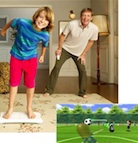Is Gamification the Next Big Initiative for Medical Marketing?
 If the word “gamification” is new to your medical marketing vocabulary, you might want to take note. Admittedly it’s an invented word, and an umbrella term for many aspects of games and game playing.
If the word “gamification” is new to your medical marketing vocabulary, you might want to take note. Admittedly it’s an invented word, and an umbrella term for many aspects of games and game playing.
But many authoritative thought leaders see the use of educational and online games as a significant influence in society that’s fast becoming mainstream. And it just may become a line item in your next marketing plan.
For the professional practitioner, hospital marketing team and healthcare corporations, elements of game playing are becoming a valuable tool for healthcare delivery systems and patient communications.
According to a new Pew Internet & American Life report, “Gamification has emerged as a way to describe interactive online design that plays on people’s competitive instincts and often incorporates the use of rewards to drive action.” The Pew Future of Gamification report predicts, “the use of game mechanics, feedback loops, and rewards will become more embedded in daily life by 2020.”
Although the Pew report includes health and healthcare among a broader perspective, the opportunities for patient education, community connectivity and support for marketing objectives is apparent.
This isn’t about youthful couch potato “gamers” who are absorbed for hours in the World of Warcraft or surviving a zombie apocalypse. Researchers, health professionals and game developers understand there are prospective benefits to healthcare.
In fact, the nation’s largest conference dedicated to videogames, health and health care comes up this month in Boston. This year’s Games for Health Conference will feature sessions about “exergaming,” physical therapy, disease management, health behavior change, biofeedback, rehab, epidemiology, training, nutrition, and health education.
The concept of health-related games has been on our radar for some time, and a little better than a year ago we wrote: Game On: Hospitals and Healthcare Marketers Are Now Playing Along. The post includes illustrations, models and idea starters that could be adapted by others. Since then, gaming concepts are being used in various aspects of healthcare marketing, patient education, patient experience and wellness.
Additional examples include treatment and medication compliance and engaging patients in healthy lifestyle games related to exercise, weight loss or smoking cessation. As a digital cousin to social media platforms, healthcare marketing games can reach and involve prospective patients and members of the community.
We’d like to hear how you’re using games or gamification in medical marketing initiatives. Send us a note or make a comment below and we’ll include the most interesting ideas in the next article in this series.









